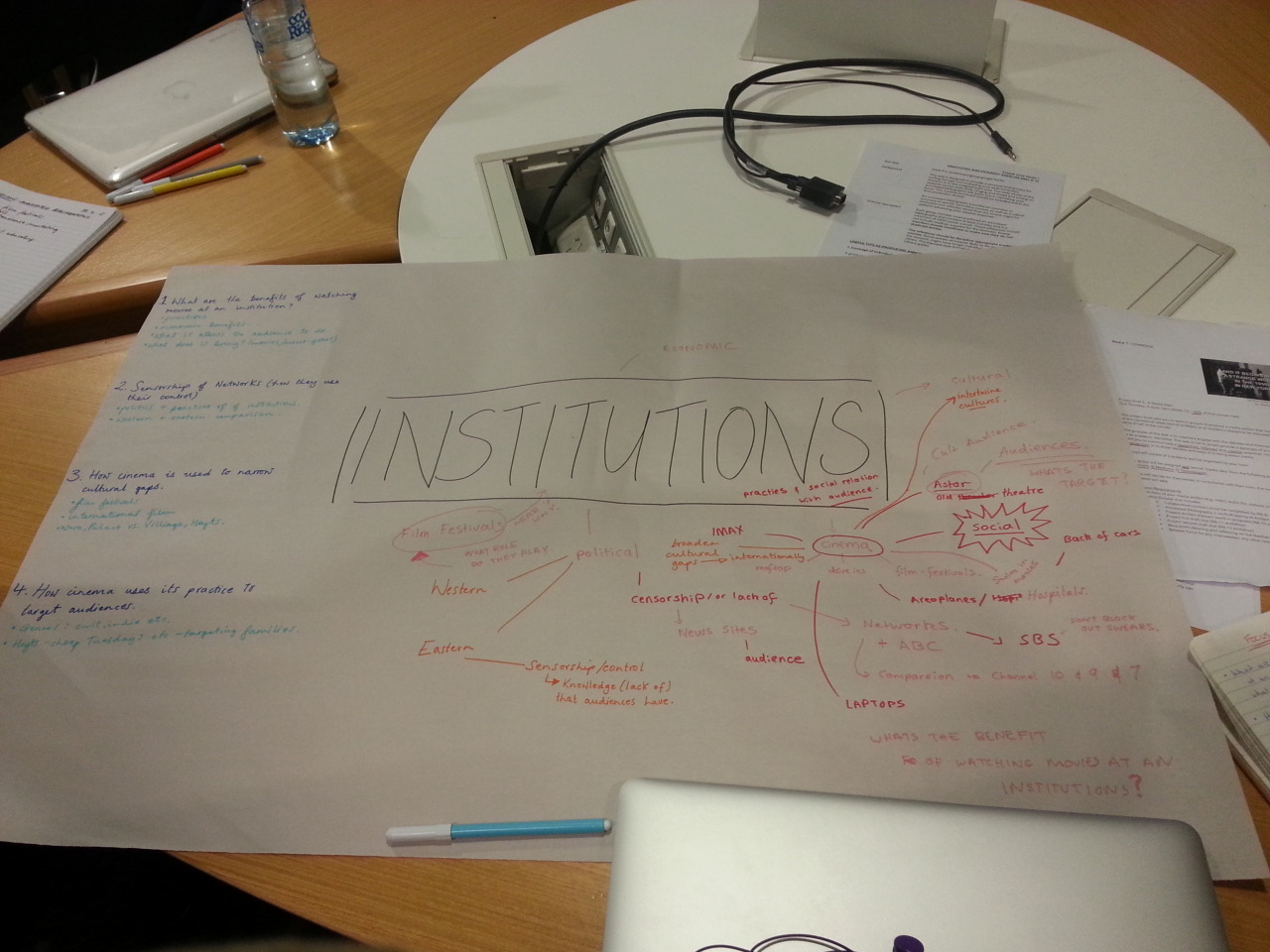I think we were able to approach this assignment in a creative way that was informed by our research rather than just presenting it. Through brainstorming we were able to move away from a video documentary and onto something new that pushed our boundaries. Deciding on broadcast felt like a risk, however it allowed us to explore the effects that festival programming has on the audience of film festivals in a way that challenged what people would have expected.
By focussing on film festivals within the topic of institutions we were able to refine and present a clear idea in our final product. Film festivals were interesting to me in particular, because a lot of research had only recently surfaced about how a festival programming directly affects its audience. This let us know that our topic was not only interesting but not overly explored, giving us reason to conduct some of our own research. We interviewed people about the three festivals we were focusing on. These results enabled us to rewrite our scripts to include thoughts and feelings from our research group, resulting in a more accurate and informed final product. The interviews also satisfied our want to get out and talk to people as outlined by our collaborative contract.
As helpful as these interviews turned out to be collecting the information was challenging. I often felt uncomfortable talking to new people and unsure if I was asking the right questions. To improve this skill I will continue to challenge myself by conducting more ethnographic research. I will work to refine my questions to create key points in the discussion, but I need to be wary becoming overly caught up on wanting to reach that next key discussion point. This is something I mentioned in my Third Project brief when interviewing Maria. Although I’ve improved I still find myself too eager to jump ahead rather than taking note of how things are being said and if there’s additional information body language can tell. To continue improving I need to slow down when I’m interviewing people and really notice. It may also help to keep a field diary to make note of expressions, body language and tones. Video recording interviews would also help as I could then watch back to see anything I’ve missed that could be explored further.
During the semester I have continually noticed sound as an area for improvement. As it was suggested after our first draft we tested with different equipment and distances, we found these sound tests produced a huge increase in the quality of our work. By draft two the sound was already much more audible because we’d took time to run a test beforehand. This is something I will continue to undertake during my media practice as I can’t stress enough how much our work has improved. Next time I would like to try testing different volumes for voices and an even wider selection of mics/recorders as we were limited in what we could obtain, as we overlooked this in our final project with some audio ended up to soft.
A more problematic area of our final work was our expression of the script overall. In our first feedback session we were asked to give “not only ham, but the whole pig.” We revised the script by pointing out certain areas where the camp could be played up, but ignores the rest of the script. To help improve on expression I think a director should be assigned next time to steer how everyone is delivering their lines and more time to learn the script would also help as we would have been able to worry less about what we needed to say and more about how to say it. Recording everyone separately lost some of the comedic timing and energy was due to us no longer being able to bounce off each other. In the future as it could be beneficial to rehearse together before going splitting up. Another good idea would be including clearer cues in the script. I personally struggled with expression due to my shyness, and often found myself speaking too quietly and not wanting to hear my recordings back. To overcome this I’ll need to push myself to take on more speaking roles. Recording what I’m going to say on my own and listening back until I’m confident will help before I join everyone else.
In our group we were loose on roles and although we still made sure everyone had a task by the end of each meeting, I feel it would have been easier to ensure people knew what was expected of them at the start of the project. Listening to what others have to say is also an important collaboration skill, and had we not all gotten together and discussed our ideas we might have just been doing a simple documentary because that was my way of approaching the task. I am much happier I was able to listen to what Emily and Georgina had to suggest as we were able to all settle on the idea of the news-like broadcast – something I would have in no way come up with alone.

 Brainstorming done in todays tutorial about institutions. We as a group started with the two institutions that interested us, Cinema and Network TV. We began to list different forms of cinema and tv and connect issues to them under: economical, political, cultural and social brackets. Some of the ideas and issues we came up with are:
Brainstorming done in todays tutorial about institutions. We as a group started with the two institutions that interested us, Cinema and Network TV. We began to list different forms of cinema and tv and connect issues to them under: economical, political, cultural and social brackets. Some of the ideas and issues we came up with are: